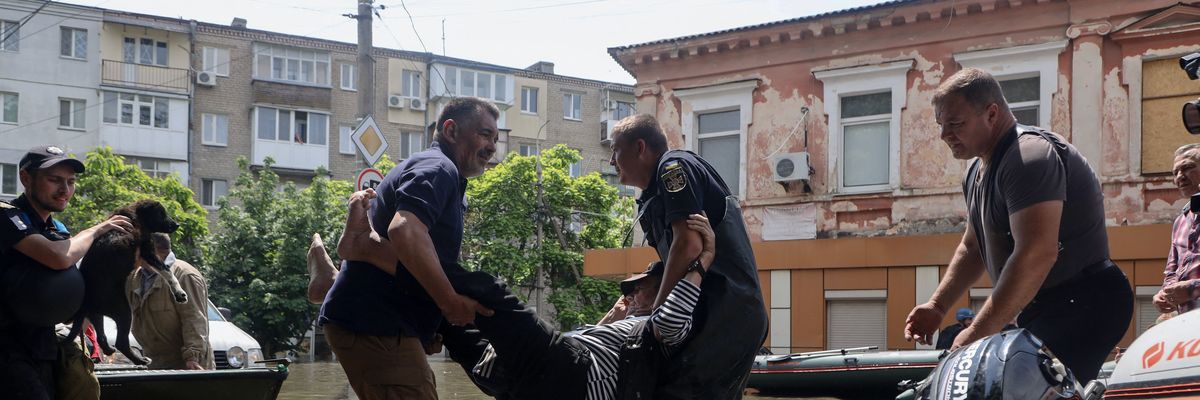With a renewed call for peace, United Nations Secretary-General António Guterres is warning that the destruction of a huge dam in a Russian-controlled area of southern Ukraine "will have grave and far-reaching consequences" for people in the region, as officials Wednesday took stock of the incredible damage.
Speaking from New York Tuesday, Guterres said the U.N. could not independently verify how the Kakhovka Hydroelectric Power Plant dam in Kherson was destroyed in what the world body called "the most significant incident of damage to civilian infrastructure since the start of the Russian Federation's invasion of Ukraine" in February 2022.
"But one thing is clear," the U.N. chief asserted, "this is another devastating consequence of the Russian invasion of Ukraine."
Noting that at least 16,000 people have already lost their homes due to the dam's destruction, Guterres called the disaster "yet another example of the horrific price of war on people."
"The floodgates of suffering have been overflowing for more than a year, and that must stop," he said, adding that "above all, I appeal for a just peace, in line with the U.N. Charter, international law, and the resolutions of the General Assembly."
Also speaking Tuesday, U.N. Under-Secretary-General for Humanitarian Affairs and Emergency Relief Coordinator Martin Griffiths said that the dam's destruction "will have grave and far-reaching consequences for thousands of people in southern Ukraine," while noting that "Ukrainian authorities have reported that at least 40 settlements in Kherson are already flooded or partially flooded, a number which is expected to rise."
The International Atomic Energy Agency—the U.N.'s nuclear watchdog—warned Tuesday that the dam's destruction has already caused a "significant' drop in water levels in the reservoir that supplies the Zaporizhzhya Nuclear Power Plant. ZNPP—Europe's largest nuclear power plant—was shelled by Russian forces in March 2022 during fighting for control of the facility, located in the eastern town of Enerhodar.
IAEA Director-General Rafael Grossi further warned that the "absence of cooling water in the essential cooling water systems for an extended period of time would cause fuel melt and inoperability of the plant's emergency diesel generators," although he added that there is no "immediate" safety risk.
Human rights groups echoed many of the U.N.'s concerns. Marie Struthers, Amnesty International's regional director for Eastern Europe and Central Asia, said in a statement that "the human and environmental cost of the destruction of the Kakhovka dam is a huge humanitarian disaster, and the international community must unite to bring those responsible to justice."
"The rules of international humanitarian law specifically protect dams, due to the dangers their destruction poses to civilians," Struthers added. "The destruction of the Kakhovka dam is a catastrophe that endangers the life, safety, and well-being of tens if not hundreds of thousands of people living within range of the flood waters. It is literally an open floodgate for catastrophic human and environmental disaster."
Robert Wood, the U.S. alternate representative for special political affairs at the U.N., on Tuesday called the dam's destruction "yet another casualty in Russia's brutal, full-scale invasion of Ukraine."
"I want to make absolutely clear: It was Russia that started this war, it was Russia that occupied this area of Ukraine, and it was Russian forces that took over the dam illegally last year and have been occupying ever since," Wood continued.
"To be clear: Deliberate attacks on civilian objects are prohibited by the law of war," added the American, whose country's military has deliberately attacked countless civilian targets during wartime, including the Tabqa dam in Syria in 2017.
Ukraine and Russia blame each other for blowing up the Kakhovka dam, with Sergiy Kyslytsya, the Ukrainian U.N. ambassador, accusing Moscow of committing "a terrorist act against Ukrainian critical infrastructure" and Vassiliy Nebenzia, his Russian counterpart, charging Kyiv with perpetrating "an unthinkable crime."
